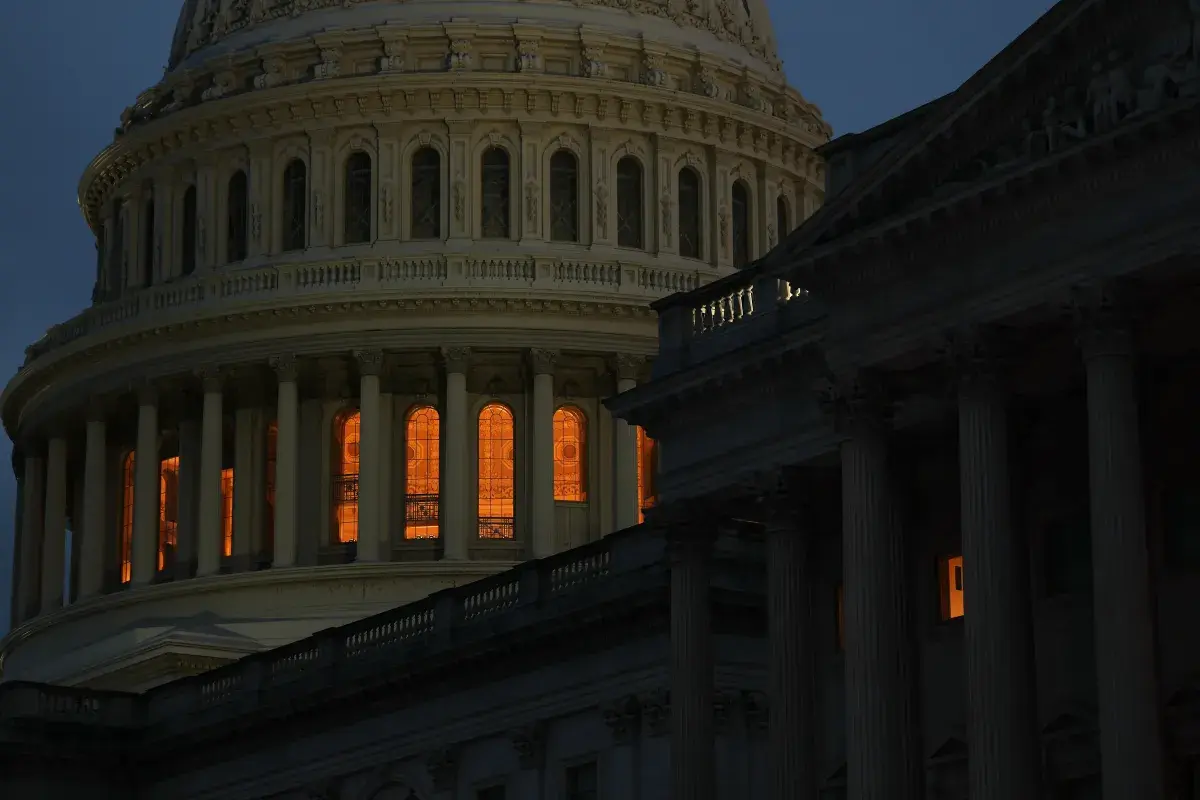Copyright Newsweek

The U.S. Senate has voted to advance a bill that would reopen the government and allow for a vote next month on extending Affordable Care Act (ACA) subsidies, but its future remains unclear in the divided Senate. Why It Matters Subsidies for the ACA, which is also known as Obamacare, have been at the core of the shutdown battle between Democrats and Republicans. They are expected to expire at the end of the year, and Democratic senators declined to advance a temporary funding bill without their extension. Democrats have argued that not extending the subsidies would lead to higher prices for healthcare insurance for Americans, but it’s unclear how many Republicans are inclined to support a bill that would extend them. What To Know The Senate voted 60-40 late Sunday evening to advance the bill to end the shutdown, which has become the longest in U.S. history. Seven Democrats and one independent joined Republicans on the bill, which must still pass the House of Representatives and be signed into law by President Donald Trump to formally reopen the government. The subsidies were created during the ACA, passed by former President Barack Obama, and allowed low-income Americans to enroll in health insurance plans. They were expanded in 2021 during the COVID-19 pandemic to allow more Americans to gain access to insurance as the economy grappled with the fallout of the virus. The credit became a sticking point during negotiations on the shutdown. Democrats sought to get the extension included in the bill. But Republicans argued for the Senate to pass the bill already passed by the House, which did not include the extension. Most Senate Democrats declined to vote for the bill, citing concerns about whether the Senate would really advance the extension. Republicans have only promised a vote on the ACA subsidies as part of the agreement. But that doesn’t mean the Senate will actually vote to extend them. Republicans hold a 53-47 majority in the Senate, so the future of the subsidies will depend on whether Democrats are able to convince 13 Republicans to vote in favor of the subsidies extension. That is a possibility, Grant Davis Reeher, a professor of political science at Syracuse University, told Newsweek on Monday. Given the amount of attention the subsidies have received during the shutdown, he said it is possible that Republicans could vote to extend them. It wouldn’t be surprising to see it narrowly fail as well, he said. “There’s also the possibility that the current subsidy may be adjusted, as part of the compromise. I’d expect that. It may become more targeted to lower incomes,” he said. Either way, there will be a recorded vote on the subsidies so long as the deal advances. If Republicans vote the bill down, Democrats will likely use that against them in next year’s midterms, when they are hoping to win back control of the House of Representatives and Senate—and are feeling more optimistic about their chances following victories in last week’s New Jersey and Virginia gubernatorial races. “If Democrats can successfully embed the subsidies as something that contributes to 'affordability,' which has become a catch-all for everything affecting a family’s pocketbook, it could play well politically for them,” Reeher said. If lawmakers do not vote to extend the credits, those beneficiaries can expect to pay higher costs. KFF reported in September that premium payments would more than double next year if the credits expire. About 24 million Americans rely on the tax credit for their health care. Many may still qualify for a smaller tax credit, but others may lose the subsidy completely. Meanwhile, health insurance companies saw their shares fall between 2 and 10 percent on Monday as the industry reacted to the deal, reported Reuters. James Harlow, senior vice president at Novare Capital Management, told the publication there is still “uncertainty” around the subsidies. “If ACA subsidies aren't extended, that's a negative for health insurers and hospitals,” he said. On Saturday morning, Trump recommended to Senate Republicans in a Truth Social post that money sent to insurance companies through the ACA should instead be sent directly to Americans so that they can handle their own healthcare concerns. What People Are Saying President Donald Trump wrote on Truth Social on Saturday morning in part: "I am recommending to Senate Republicans that the Hundreds of Billions of Dollars currently being sent to money sucking Insurance Companies in order to save the bad Healthcare provided by ObamaCare, BE SENT DIRECTLY TO THE PEOPLE SO THAT THEY CAN PURCHASE THEIR OWN, MUCH BETTER, HEALTHCARE, and have money left over. In other words, take from the BIG, BAD Insurance Companies, give it to the people, and terminate, per Dollar spent, the worst Healthcare anywhere in the World, ObamaCare." Senator Jeanne Shaheen, a New Hampshire Democrat and key negotiator, said in a press conference: “This is only the first step, so let me be clear. No one in the Senate chamber wants to extend the ACA tax credits more than I do. I introduced that legislation in 2019. I fought successfully to pass it in 2021 and 2023, and I am 100 percent committed to getting this done.” Representative Alexandria Ocasio-Cortez, a New York Democrat, wrote on X: “The average monthly SNAP benefit is $177 a person. The average ACA benefit is up to $550 a person/mo. People want us to hold the line for a reason. This is not a matter of appealing to a base. It’s about people’s lives. Working people want leaders whose word means something.” House Speaker Mike Johnson, a Louisiana Republican, wrote on X: “After 40 days of the Schumer Shutdown, working families have suffered, thousands of workers have gone unpaid, and air travel has been greatly slowed. As we’ve said from the beginning: the people’s government should not be held hostage. The House will move quickly this week to reopen the government, pay our workers, and end the pain this unnecessary shutdown has caused the American people.” What Happens Next? The House of Representatives must now vote on the agreement to reopen the government.



